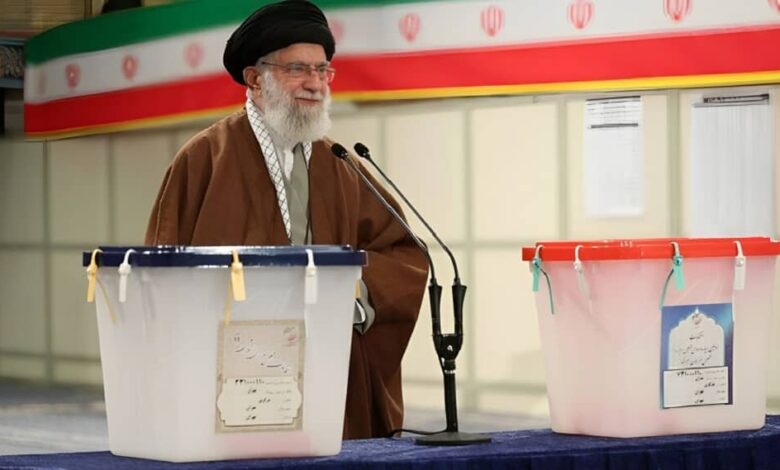Low Election Turnout Will Turn Iran into Dictatorship or… Chaos, Khamenei Warns

khamenei elections ballot box
Written by
Mahmoud Hakamian
In the 45th year of Iran’s religious dictatorship, Ali Khamenei, the Supreme Leader who has maintained power through a 34-year reign marked by terror and bloodshed, expressed concern about the potential rise of dictatorship. On December 23, Khamenei stated, “Some criticize the holding of elections, causing frustration. They fail to realize that without elections, the country would face either dictatorship or chaos, turmoil, and insecurity.”
During a meeting with a close-knit group of followers referred to as the people from Khuzestan and Kerman, as per Khamenei’s website, he emphasized, “The terms ‘Republic’ and ‘Islamic’ both rely on elections. A republic implies rule by the people, where governance is in the hands of the people through elections. Discouraging participation in elections is harmful to the country. The solution to the country’s problems lies in the democratic process of elections.”
Yet, observers of Iran’s unfolding events have discerned Khamenei’s months-long preparation for an extensive purge of the parliament. The Majlis, rigorously vetted four years ago by the Guardian Council, has recently hindered the approval of bills favored by the Supreme Leader and the Raisi government. In early November, an entity linked to the Ministry of Interior disqualified numerous parliamentary candidates, including dozens of incumbent members, effectively barring them from participating in the upcoming parliamentary sham elections.
Warnings against a nationwide boycott have been issued by numerous officials from previous governments, parliaments, and even rival factions. This sentiment is echoed by segments of society that previously benefited from the regime, revealing a growing disillusionment and a decline in turnout in recent years.
Ali Rabiee, the former Minister of Labor, spokesperson for Hassan Rouhani’s government, and former deputy of the Ministry of Intelligence warned, “Contrary to past periods, as we approach the elections, the level of participation is decreasing.”
#Iran News in Brief
Predicting that voter turnout in the upcoming parliamentary sham #elections will be less than 10 percent, Ahmad Zeydabadi, a state-affiliated analyst warned against the ultimate decline of the clerical regime.
Read more:https://t.co/vjvoqBul9K pic.twitter.com/opLkeZuiN8— NCRI-FAC (@iran_policy) August 12, 2023
Rabiee further elaborated, “The ISPA survey report indicates that 27.9% of the people have stated that they will definitely participate in the elections. 7.4% are likely to participate. 21.9% have not yet decided on their participation. 36% have declared that they will not participate in these elections in any way. Additionally, 6.8% have expressed a low probability of participating in these elections. By combining those who have definitively expressed their intention to participate with half of those likely to participate, we reach an approximate figure of 32%, which is a more precise number.”
On the other hand, media outlets aligned with the Raisi government are making concerted efforts, utilizing advertisements and featuring previously marginalized figures, to appeal to the so-called voters and boost turnout. Simultaneously, as the election date draws near, a significant amount of news regarding conflicts among leaders of the three branches as well as their associates in the current parliament is gaining prominence in state-controlled media outlets.
The upcoming parliamentary elections, scheduled for March 1, 2024, are designated to choose representatives for the twelfth term of the regime’s parliament, consisting of 290 representatives serving a four-year tenure. It will coincide with the sham elections for the sixth term of the “Assembly of Experts on Leadership.” Due to the age and health condition of Ali Khamenei, there is widespread speculation that the next Assembly of Experts will play a pivotal role in determining the future Supreme Leader and consequently, the fate of the regime.
#Iran News in Brief
A former member of the Iranian regime’s parliament expressed concerns about the upcoming parliamentary sham #elections, stating that a significant portion of the population has lost faith in the system and no longer believes in anything except for regime… pic.twitter.com/M9MdBXfl31— NCRI-FAC (@iran_policy) September 3, 2023
Official announcements from state institutions, which are often criticized for their lack of transparency and accuracy in reporting, indicated a voter turnout of “42.57 percent” in the previous parliamentary elections held on June 18, 2021. This turnout was one of the lowest reported in the past four decades.
In recent years, Khamenei has pursued a strategy of consolidating power by purging numerous members of rival factions, even former allies. This has led to a diminished and more precarious support base for his leadership. Consequently, the Supreme Leader and his allies are apprehensive that, given the revolutionary sentiments within Iranian society, they will certainly face challenges in rallying support and suppressing dissent, potentially undermining their regime.
There are indications that in the upcoming sham elections, various parties and groups aligned with former presidents Mohammad Khatami and Hassan Rouhani have declared their decision not to nominate candidates.
Yet, despite threats from the ruling faction to exclude him, Hassan Rouhani has announced his candidacy for the Assembly of Experts elections. While cautioning that sidelining him could lead to worse consequences for the regime, Rouhani conveyed to a gathering of clerics on December 23, “Sometimes not voting in the elections is a form of voting.”
During the 2022 uprising, which extended over several months and witnessed widespread protests across Iran calling for the overthrow of the clerical dictatorship, Khamenei addressed the nation publicly more than five times within a few weeks. He appealed for the support of both current and former officials for his government. However, this unprecedented move was largely disregarded by the highest-ranking authorities.
As Khamenei calls for a high voter turnout while positioning himself for further purges in his regime in pursuit of what he perceives a more loyal reign is also a stronger one, it is only a matter of time before the next uprising will prove him wrong.

